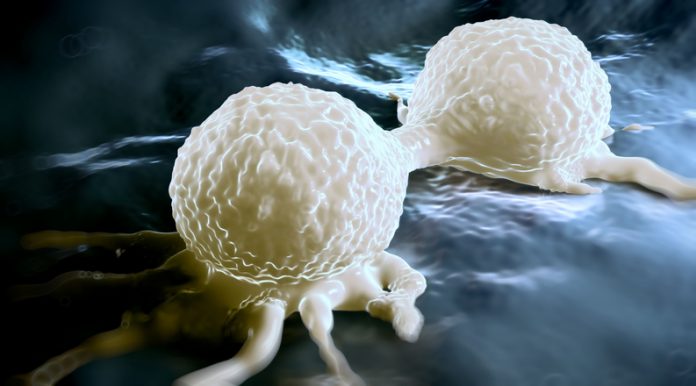
A team of investigators at Vanderbilt-Ingram Cancer Center, reporting in Cancer Discovery, has discovered a druggable target on natural killer cells that could create a therapeutic response in patients with immunotherapy-resistant triple-negative breast cancer.
While immunotherapy has shown promise across a range of cancers and tumor types, only about 15% of patients with triple-negative breast cancer respond to a combination treatment of immunotherapy to stimulate immune cells to attack the tumor, and chemotherapy. The research team at Vanderbilt, led by Justin Balko, PharmD, PhD, an associate professor of Cancer Research, sought to better understand why many patients don’t respond to this treatment regimen, in order to personalize treatments that can minimize adverse side effect.
The team’s research highlighted the role played by NKG2A receptors—which reside on immune cells capable of attacking cancer—as potential targets for overcoming immunotherapy treatment resistance in breast cancer.
NKG2A (Natural Killer Group 2A) is a type II transmembrane glycoprotein receptor that belongs to the C-type lectin-like receptor family. It is expressed on the surface of natural killer (NK) cells and a subset of T cells. NKG2A forms a heterodimer with CD94, another C-type lectin-like receptor, and together they constitute the NKG2A/CD94 receptor complex. The primary function of NKG2A/CD94 receptors is to recognize and interact with specific molecules on the surface of target cells.
For their work, Balko and team studied tumor-specific Mahor Histocompatibility Complex (tsMHC-I). As they examine the variability of tsMHC-I in breast cancer and in mouse models, they discovered high heterogeneity in the expression of this molecule, which they linked to the lack of response from immunotherapy. Looking to overcomes this resistance, the researchers found that combining anti-NKG2A with anti-PD-L1 immune checkpoint inhibitors represents a promising—and unexplored—approach for treating triple-negative breast cancer.
“These findings shed some light on at least one reason why only a small fraction of breast cancer patients benefit from immunotherapy—their tumors have already found a way to remove a critical component for immunotherapy response,” noted Balko, the study’s corresponding author. “However, understanding this gives us a potential biomarker for identifying those patients and, perhaps more importantly, exposes a new way to target the tumor cells that have escaped the immune system.”
Lead authors Brandie C. Taylor and Xiaopeng Sun, who are graduate students in the Balko Lab, added: “This study was the result of a collaborative effort between researchers and clinicians. We hope our findings will help determine which triple-negative breast cancer patients should receive immunotherapy and which patients may benefit from the addition of anti-NKG2A in clinical trials.”













